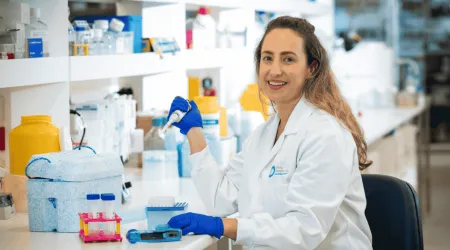What does research say about medical marijuana for colorectal cancer?
If there is one common theme in all of the literature and scientific papers, it is that cannabis and cannabinoids enhance the benefits of conventional treatment for side effect management. For cancer patients, this is most notable in chemotherapy-induced nausea and vomiting as well as pain management.
In an article published in the Journal of the American Medical Association Oncology, authors reviewed the literature surrounding the treatment of cancer with cannabis. While the majority of the data came from animal trials, results were positive. For example, tetrahydrocannabinol (THC) slowed lung cancer tumor growth in mice. Although the information is promising in animals, further research in human clinical trials is needed.
What the clinical trials are saying:
While there have been a few clinical trials in humans studying the use of cannabis as a cancer treatment, the results are either inconclusive or still pending. Some of these clinical trials include:
A clinical trial in humans with malignant brain cancer (glioblastoma multiforme aka GBM) showed tumor shrinkage in two out of nine patients when THC was administered directly into the tumor. Unfortunately, even though the tumors shrunk, the patients did not live longer.
Two other clinical trials in Israel are studying the treatment of GBM with cannabis in patients who have failed all other treatments.
Another clinical trial in Israel is studying cannabinol as a single agent in patients with solid tumors who have failed all other therapies.
Now that you have the research…
Points to consider when deciding whether to take medical marijuana:
Impact on treatment: Regardless of whether or not marijuana is legal in your state, it is important to tell your doctor if and how you use marijuana, either recreationally or medically, and the frequency of your use. Marijuana interferes with the metabolism of many drugs, including chemotherapeutic agents and herbal supplements. Marijuana is metabolized in the liver as are many chemotherapy agents.
Side effects: Evaluate whether the side effects and adverse effects of medical marijuana outweigh the perceived benefits. Medical marijuana, along with many FDA-approved drugs and alcohol, all have adverse effects. It is important to weigh the pros and cons.
Not a cure-all: If you choose to use medical marijuana for chemotherapy-induced nausea and vomiting, it is best to use it along with standard treatments.
False hope: Cannabis in any form, including oil, does not cure cancer. Additionally, there is no evidence that it prevents cancer. The oil can actually be toxic due to the high concentrations of chemicals. If you are going to use medical marijuana, do not think of it as a cure-all.
No quality control: Just because it is natural does not mean it is safe. Medical marijuana is not guaranteed to have the compounds that may be specified because there is no regulatory body monitoring medical marijuana manufacturing.
Variance by state: The list of acceptable conditions and the amount of medical marijuana a person is allowed to have and/or grow depends on the state in which you live. Make sure you know your state’s laws.
Addiction: It’s better not to use medical marijuana if you have a history of substance abuse. Approximately nine percent of adults who use marijuana become addicted.
If you or someone you love is considering medical marijuana, do your research, look at the references we provide, talk with others, and speak with your doctor.
If you are in need of support, please contact our free Helpline at (877) 422-2030. We’re here to help.
Top resources

Where breakthroughs begin: Project Cure CRC spotlight on Dr. Lisa Mielke
hrough Project Cure CRC, the Alliance is fueling bold, early-stage research with the potential to transform colorectal cancer treatment. Dr. Lisa Mielke’s groundbreaking work explores how the gut’s immune system and nerve signaling influence cancer growth—opening the door to new therapeutic approaches, including repurposed existing drugs. This is what’s possible when promising ideas get the support they need to move forward.

Bringing biomarker testing within reach: CLEAR for CRC to empower patients from day one
Biomarker testing can guide colorectal cancer treatment and improve outcomes. Learn how CLEAR for CRC is helping patients access this critical tool.

John E.: Biomarker testing uncovered a pivotal treatment option
After a grim prognosis, biomarker testing revealed a targeted treatment option for John E. Learn how knowing your biomarkers can change what’s possible.





